Organisational Behaviour at Marks & Spencer: Culture and Performance
VerifiedAdded on 2023/06/18
|14
|4323
|496
Report
AI Summary
This report delves into the realm of organisational behaviour, focusing on the influence of culture, politics, and power on individual and team performance within Marks & Spencer. It explores various motivation theories, including content theories like Maslow's hierarchy of needs and process theories such as Vroom's expectancy theory and Locke and Latham's goal setting theory, to understand employee motivation. The report also compares effective and ineffective teams, highlighting the impact of internal politics and cultural dynamics on team outcomes. Furthermore, it examines Handy's typology of culture, including power, role, person, and task cultures, and their implications for organisational success. The analysis provides insights into how leadership and management practices can foster a positive work environment and enhance overall organisational performance within a retail context.
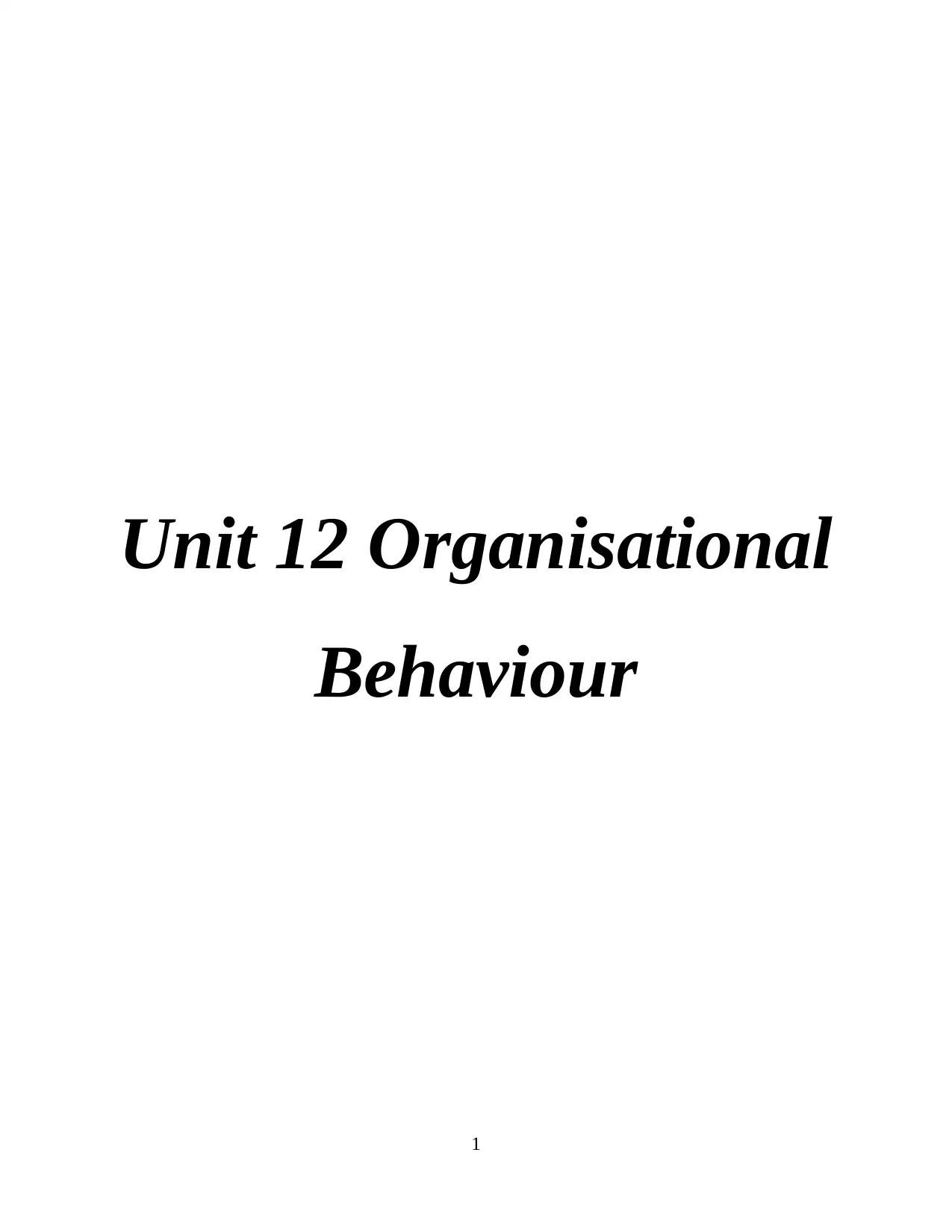
Unit 12 Organisational
Behaviour
1
Behaviour
1
Paraphrase This Document
Need a fresh take? Get an instant paraphrase of this document with our AI Paraphraser
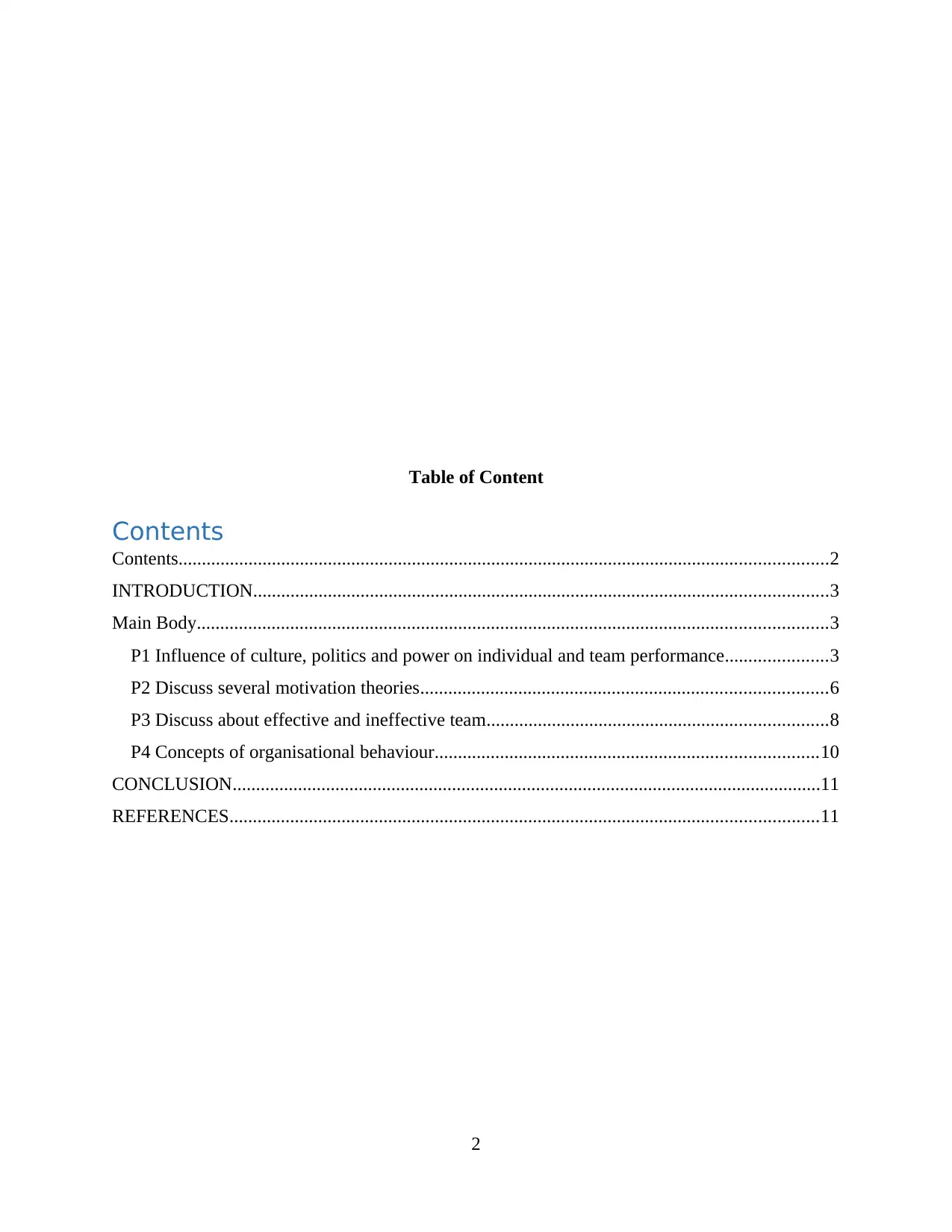
Table of Content
Contents
Contents...........................................................................................................................................2
INTRODUCTION...........................................................................................................................3
Main Body.......................................................................................................................................3
P1 Influence of culture, politics and power on individual and team performance......................3
P2 Discuss several motivation theories.......................................................................................6
P3 Discuss about effective and ineffective team.........................................................................8
P4 Concepts of organisational behaviour..................................................................................10
CONCLUSION..............................................................................................................................11
REFERENCES..............................................................................................................................11
2
Contents
Contents...........................................................................................................................................2
INTRODUCTION...........................................................................................................................3
Main Body.......................................................................................................................................3
P1 Influence of culture, politics and power on individual and team performance......................3
P2 Discuss several motivation theories.......................................................................................6
P3 Discuss about effective and ineffective team.........................................................................8
P4 Concepts of organisational behaviour..................................................................................10
CONCLUSION..............................................................................................................................11
REFERENCES..............................................................................................................................11
2
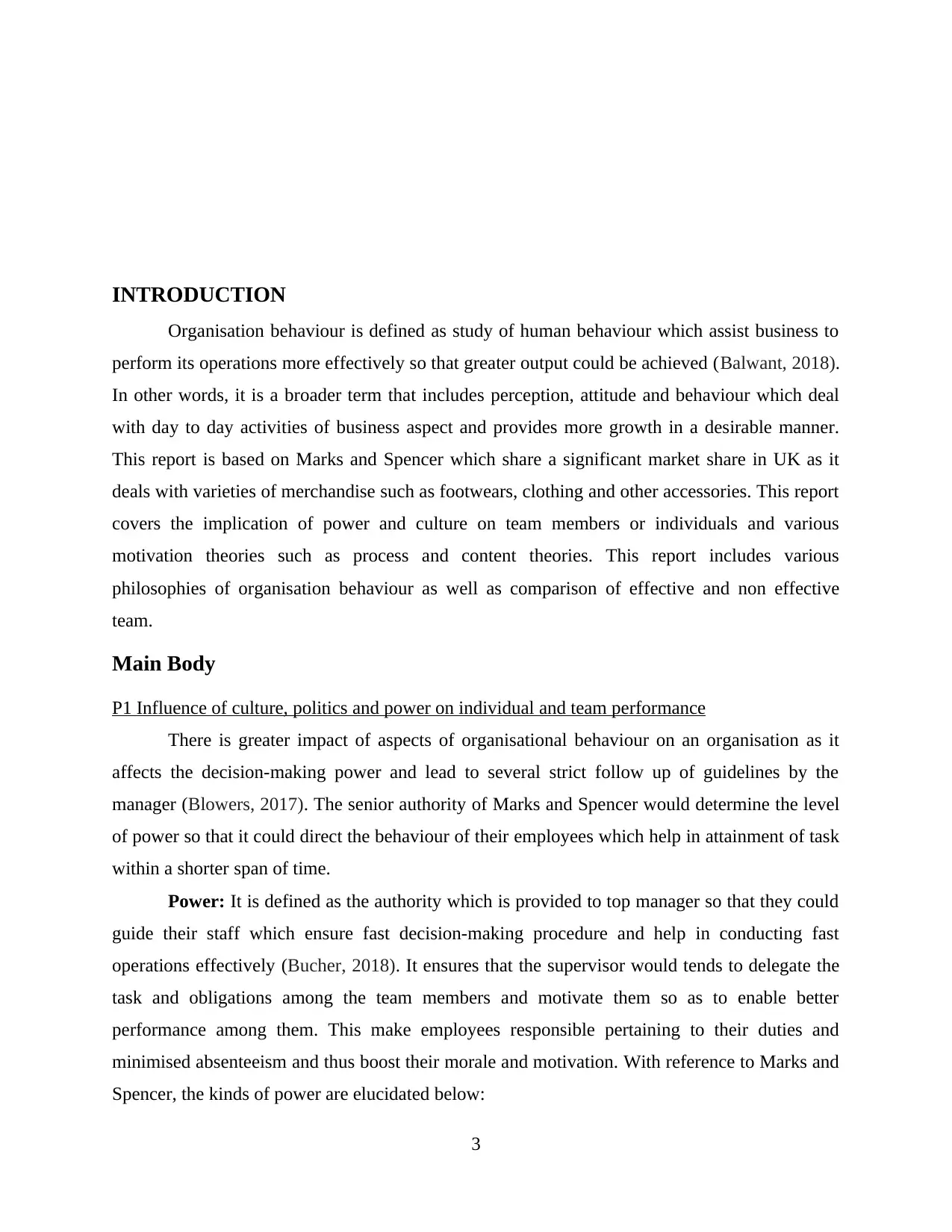
INTRODUCTION
Organisation behaviour is defined as study of human behaviour which assist business to
perform its operations more effectively so that greater output could be achieved (Balwant, 2018).
In other words, it is a broader term that includes perception, attitude and behaviour which deal
with day to day activities of business aspect and provides more growth in a desirable manner.
This report is based on Marks and Spencer which share a significant market share in UK as it
deals with varieties of merchandise such as footwears, clothing and other accessories. This report
covers the implication of power and culture on team members or individuals and various
motivation theories such as process and content theories. This report includes various
philosophies of organisation behaviour as well as comparison of effective and non effective
team.
Main Body
P1 Influence of culture, politics and power on individual and team performance
There is greater impact of aspects of organisational behaviour on an organisation as it
affects the decision-making power and lead to several strict follow up of guidelines by the
manager (Blowers, 2017). The senior authority of Marks and Spencer would determine the level
of power so that it could direct the behaviour of their employees which help in attainment of task
within a shorter span of time.
Power: It is defined as the authority which is provided to top manager so that they could
guide their staff which ensure fast decision-making procedure and help in conducting fast
operations effectively (Bucher, 2018). It ensures that the supervisor would tends to delegate the
task and obligations among the team members and motivate them so as to enable better
performance among them. This make employees responsible pertaining to their duties and
minimised absenteeism and thus boost their morale and motivation. With reference to Marks and
Spencer, the kinds of power are elucidated below:
3
Organisation behaviour is defined as study of human behaviour which assist business to
perform its operations more effectively so that greater output could be achieved (Balwant, 2018).
In other words, it is a broader term that includes perception, attitude and behaviour which deal
with day to day activities of business aspect and provides more growth in a desirable manner.
This report is based on Marks and Spencer which share a significant market share in UK as it
deals with varieties of merchandise such as footwears, clothing and other accessories. This report
covers the implication of power and culture on team members or individuals and various
motivation theories such as process and content theories. This report includes various
philosophies of organisation behaviour as well as comparison of effective and non effective
team.
Main Body
P1 Influence of culture, politics and power on individual and team performance
There is greater impact of aspects of organisational behaviour on an organisation as it
affects the decision-making power and lead to several strict follow up of guidelines by the
manager (Blowers, 2017). The senior authority of Marks and Spencer would determine the level
of power so that it could direct the behaviour of their employees which help in attainment of task
within a shorter span of time.
Power: It is defined as the authority which is provided to top manager so that they could
guide their staff which ensure fast decision-making procedure and help in conducting fast
operations effectively (Bucher, 2018). It ensures that the supervisor would tends to delegate the
task and obligations among the team members and motivate them so as to enable better
performance among them. This make employees responsible pertaining to their duties and
minimised absenteeism and thus boost their morale and motivation. With reference to Marks and
Spencer, the kinds of power are elucidated below:
3
⊘ This is a preview!⊘
Do you want full access?
Subscribe today to unlock all pages.

Trusted by 1+ million students worldwide
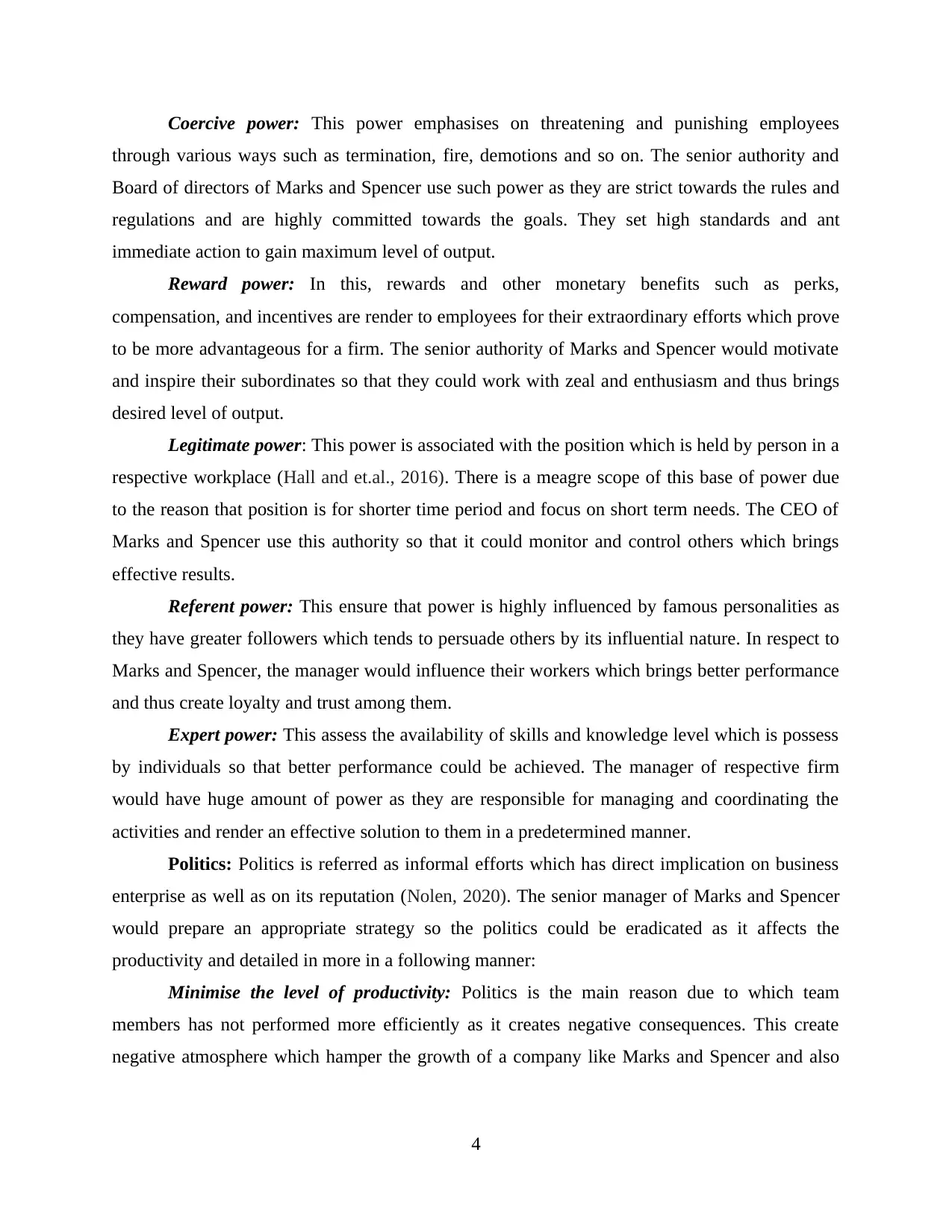
Coercive power: This power emphasises on threatening and punishing employees
through various ways such as termination, fire, demotions and so on. The senior authority and
Board of directors of Marks and Spencer use such power as they are strict towards the rules and
regulations and are highly committed towards the goals. They set high standards and ant
immediate action to gain maximum level of output.
Reward power: In this, rewards and other monetary benefits such as perks,
compensation, and incentives are render to employees for their extraordinary efforts which prove
to be more advantageous for a firm. The senior authority of Marks and Spencer would motivate
and inspire their subordinates so that they could work with zeal and enthusiasm and thus brings
desired level of output.
Legitimate power: This power is associated with the position which is held by person in a
respective workplace (Hall and et.al., 2016). There is a meagre scope of this base of power due
to the reason that position is for shorter time period and focus on short term needs. The CEO of
Marks and Spencer use this authority so that it could monitor and control others which brings
effective results.
Referent power: This ensure that power is highly influenced by famous personalities as
they have greater followers which tends to persuade others by its influential nature. In respect to
Marks and Spencer, the manager would influence their workers which brings better performance
and thus create loyalty and trust among them.
Expert power: This assess the availability of skills and knowledge level which is possess
by individuals so that better performance could be achieved. The manager of respective firm
would have huge amount of power as they are responsible for managing and coordinating the
activities and render an effective solution to them in a predetermined manner.
Politics: Politics is referred as informal efforts which has direct implication on business
enterprise as well as on its reputation (Nolen, 2020). The senior manager of Marks and Spencer
would prepare an appropriate strategy so the politics could be eradicated as it affects the
productivity and detailed in more in a following manner:
Minimise the level of productivity: Politics is the main reason due to which team
members has not performed more efficiently as it creates negative consequences. This create
negative atmosphere which hamper the growth of a company like Marks and Spencer and also
4
through various ways such as termination, fire, demotions and so on. The senior authority and
Board of directors of Marks and Spencer use such power as they are strict towards the rules and
regulations and are highly committed towards the goals. They set high standards and ant
immediate action to gain maximum level of output.
Reward power: In this, rewards and other monetary benefits such as perks,
compensation, and incentives are render to employees for their extraordinary efforts which prove
to be more advantageous for a firm. The senior authority of Marks and Spencer would motivate
and inspire their subordinates so that they could work with zeal and enthusiasm and thus brings
desired level of output.
Legitimate power: This power is associated with the position which is held by person in a
respective workplace (Hall and et.al., 2016). There is a meagre scope of this base of power due
to the reason that position is for shorter time period and focus on short term needs. The CEO of
Marks and Spencer use this authority so that it could monitor and control others which brings
effective results.
Referent power: This ensure that power is highly influenced by famous personalities as
they have greater followers which tends to persuade others by its influential nature. In respect to
Marks and Spencer, the manager would influence their workers which brings better performance
and thus create loyalty and trust among them.
Expert power: This assess the availability of skills and knowledge level which is possess
by individuals so that better performance could be achieved. The manager of respective firm
would have huge amount of power as they are responsible for managing and coordinating the
activities and render an effective solution to them in a predetermined manner.
Politics: Politics is referred as informal efforts which has direct implication on business
enterprise as well as on its reputation (Nolen, 2020). The senior manager of Marks and Spencer
would prepare an appropriate strategy so the politics could be eradicated as it affects the
productivity and detailed in more in a following manner:
Minimise the level of productivity: Politics is the main reason due to which team
members has not performed more efficiently as it creates negative consequences. This create
negative atmosphere which hamper the growth of a company like Marks and Spencer and also
4
Paraphrase This Document
Need a fresh take? Get an instant paraphrase of this document with our AI Paraphraser
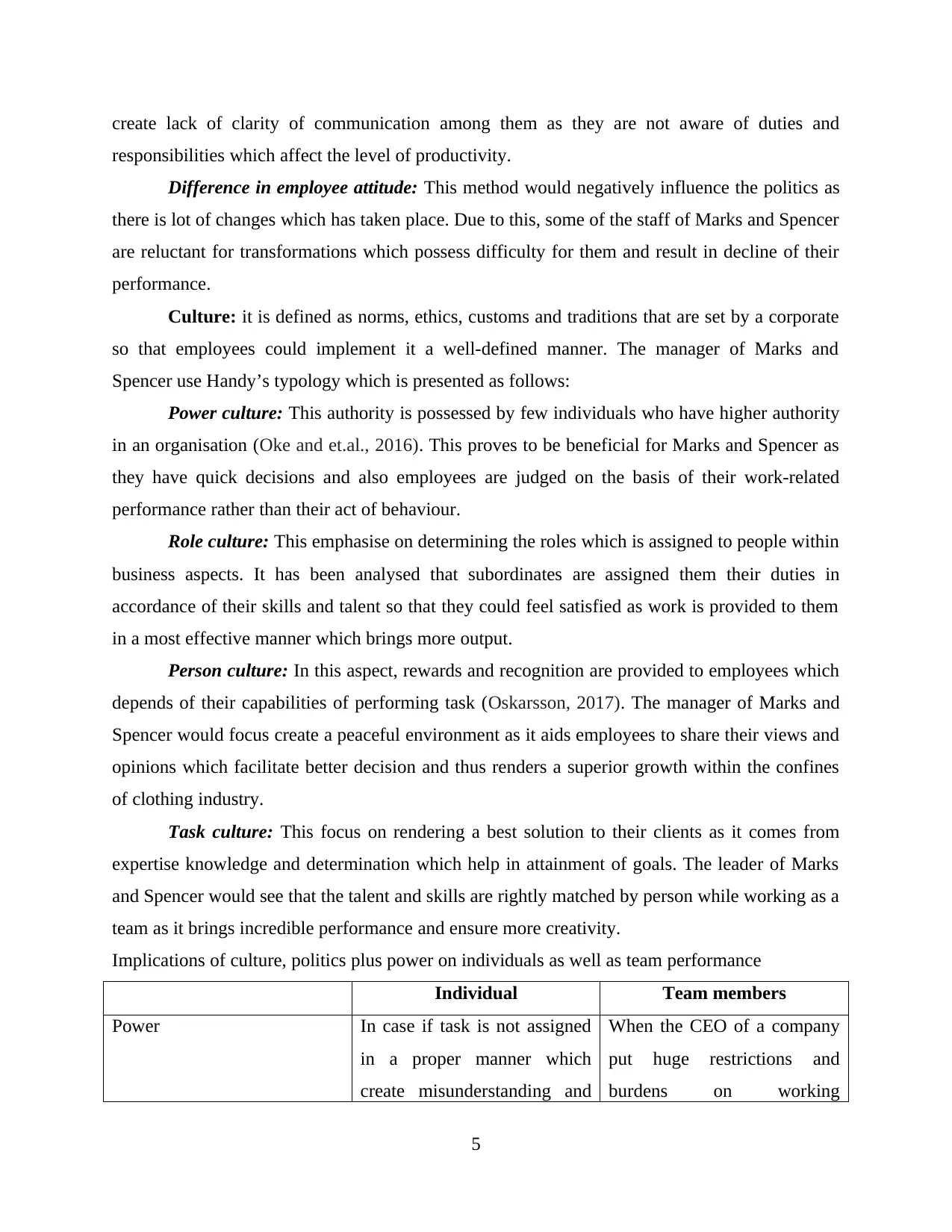
create lack of clarity of communication among them as they are not aware of duties and
responsibilities which affect the level of productivity.
Difference in employee attitude: This method would negatively influence the politics as
there is lot of changes which has taken place. Due to this, some of the staff of Marks and Spencer
are reluctant for transformations which possess difficulty for them and result in decline of their
performance.
Culture: it is defined as norms, ethics, customs and traditions that are set by a corporate
so that employees could implement it a well-defined manner. The manager of Marks and
Spencer use Handy’s typology which is presented as follows:
Power culture: This authority is possessed by few individuals who have higher authority
in an organisation (Oke and et.al., 2016). This proves to be beneficial for Marks and Spencer as
they have quick decisions and also employees are judged on the basis of their work-related
performance rather than their act of behaviour.
Role culture: This emphasise on determining the roles which is assigned to people within
business aspects. It has been analysed that subordinates are assigned them their duties in
accordance of their skills and talent so that they could feel satisfied as work is provided to them
in a most effective manner which brings more output.
Person culture: In this aspect, rewards and recognition are provided to employees which
depends of their capabilities of performing task (Oskarsson, 2017). The manager of Marks and
Spencer would focus create a peaceful environment as it aids employees to share their views and
opinions which facilitate better decision and thus renders a superior growth within the confines
of clothing industry.
Task culture: This focus on rendering a best solution to their clients as it comes from
expertise knowledge and determination which help in attainment of goals. The leader of Marks
and Spencer would see that the talent and skills are rightly matched by person while working as a
team as it brings incredible performance and ensure more creativity.
Implications of culture, politics plus power on individuals as well as team performance
Individual Team members
Power In case if task is not assigned
in a proper manner which
create misunderstanding and
When the CEO of a company
put huge restrictions and
burdens on working
5
responsibilities which affect the level of productivity.
Difference in employee attitude: This method would negatively influence the politics as
there is lot of changes which has taken place. Due to this, some of the staff of Marks and Spencer
are reluctant for transformations which possess difficulty for them and result in decline of their
performance.
Culture: it is defined as norms, ethics, customs and traditions that are set by a corporate
so that employees could implement it a well-defined manner. The manager of Marks and
Spencer use Handy’s typology which is presented as follows:
Power culture: This authority is possessed by few individuals who have higher authority
in an organisation (Oke and et.al., 2016). This proves to be beneficial for Marks and Spencer as
they have quick decisions and also employees are judged on the basis of their work-related
performance rather than their act of behaviour.
Role culture: This emphasise on determining the roles which is assigned to people within
business aspects. It has been analysed that subordinates are assigned them their duties in
accordance of their skills and talent so that they could feel satisfied as work is provided to them
in a most effective manner which brings more output.
Person culture: In this aspect, rewards and recognition are provided to employees which
depends of their capabilities of performing task (Oskarsson, 2017). The manager of Marks and
Spencer would focus create a peaceful environment as it aids employees to share their views and
opinions which facilitate better decision and thus renders a superior growth within the confines
of clothing industry.
Task culture: This focus on rendering a best solution to their clients as it comes from
expertise knowledge and determination which help in attainment of goals. The leader of Marks
and Spencer would see that the talent and skills are rightly matched by person while working as a
team as it brings incredible performance and ensure more creativity.
Implications of culture, politics plus power on individuals as well as team performance
Individual Team members
Power In case if task is not assigned
in a proper manner which
create misunderstanding and
When the CEO of a company
put huge restrictions and
burdens on working
5
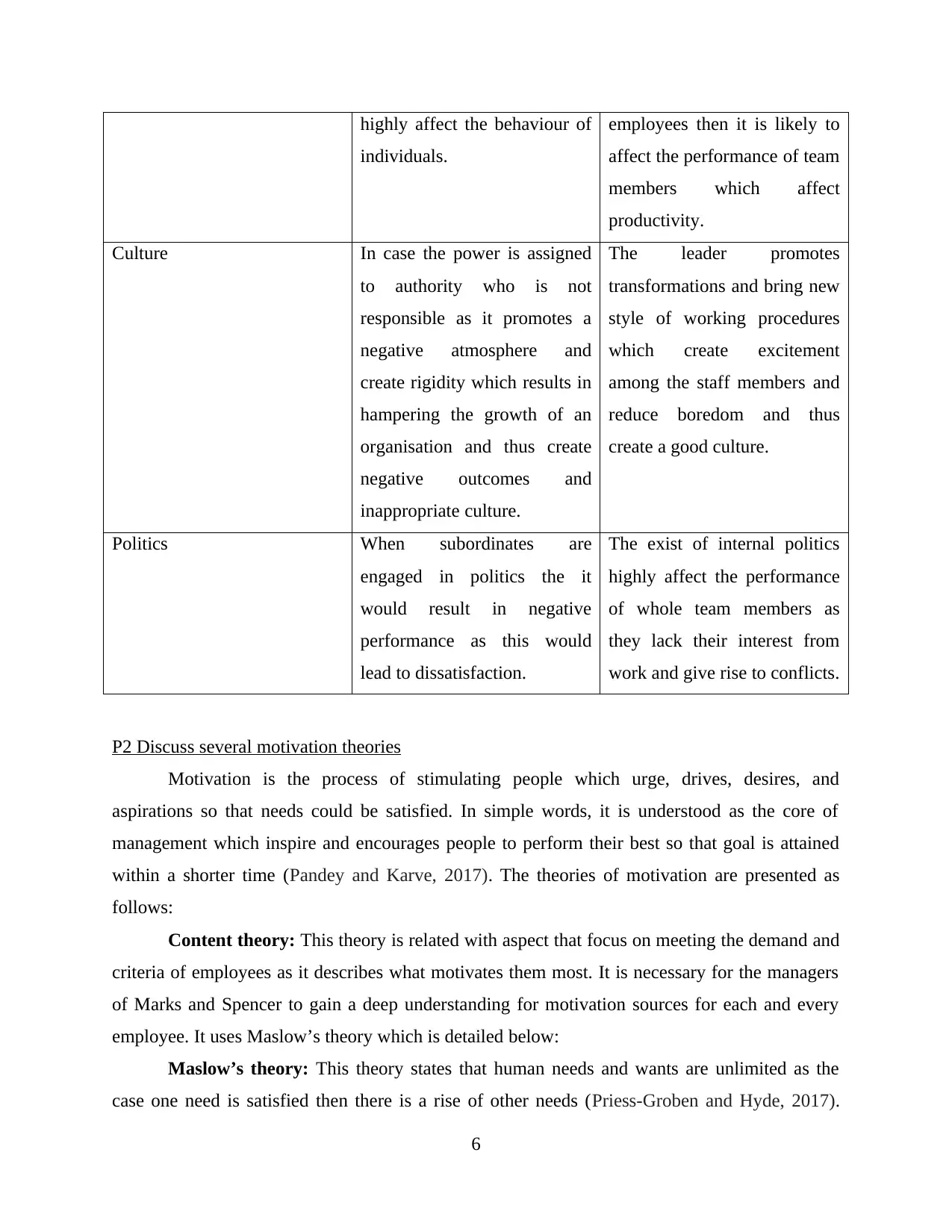
highly affect the behaviour of
individuals.
employees then it is likely to
affect the performance of team
members which affect
productivity.
Culture In case the power is assigned
to authority who is not
responsible as it promotes a
negative atmosphere and
create rigidity which results in
hampering the growth of an
organisation and thus create
negative outcomes and
inappropriate culture.
The leader promotes
transformations and bring new
style of working procedures
which create excitement
among the staff members and
reduce boredom and thus
create a good culture.
Politics When subordinates are
engaged in politics the it
would result in negative
performance as this would
lead to dissatisfaction.
The exist of internal politics
highly affect the performance
of whole team members as
they lack their interest from
work and give rise to conflicts.
P2 Discuss several motivation theories
Motivation is the process of stimulating people which urge, drives, desires, and
aspirations so that needs could be satisfied. In simple words, it is understood as the core of
management which inspire and encourages people to perform their best so that goal is attained
within a shorter time (Pandey and Karve, 2017). The theories of motivation are presented as
follows:
Content theory: This theory is related with aspect that focus on meeting the demand and
criteria of employees as it describes what motivates them most. It is necessary for the managers
of Marks and Spencer to gain a deep understanding for motivation sources for each and every
employee. It uses Maslow’s theory which is detailed below:
Maslow’s theory: This theory states that human needs and wants are unlimited as the
case one need is satisfied then there is a rise of other needs (Priess-Groben and Hyde, 2017).
6
individuals.
employees then it is likely to
affect the performance of team
members which affect
productivity.
Culture In case the power is assigned
to authority who is not
responsible as it promotes a
negative atmosphere and
create rigidity which results in
hampering the growth of an
organisation and thus create
negative outcomes and
inappropriate culture.
The leader promotes
transformations and bring new
style of working procedures
which create excitement
among the staff members and
reduce boredom and thus
create a good culture.
Politics When subordinates are
engaged in politics the it
would result in negative
performance as this would
lead to dissatisfaction.
The exist of internal politics
highly affect the performance
of whole team members as
they lack their interest from
work and give rise to conflicts.
P2 Discuss several motivation theories
Motivation is the process of stimulating people which urge, drives, desires, and
aspirations so that needs could be satisfied. In simple words, it is understood as the core of
management which inspire and encourages people to perform their best so that goal is attained
within a shorter time (Pandey and Karve, 2017). The theories of motivation are presented as
follows:
Content theory: This theory is related with aspect that focus on meeting the demand and
criteria of employees as it describes what motivates them most. It is necessary for the managers
of Marks and Spencer to gain a deep understanding for motivation sources for each and every
employee. It uses Maslow’s theory which is detailed below:
Maslow’s theory: This theory states that human needs and wants are unlimited as the
case one need is satisfied then there is a rise of other needs (Priess-Groben and Hyde, 2017).
6
⊘ This is a preview!⊘
Do you want full access?
Subscribe today to unlock all pages.

Trusted by 1+ million students worldwide
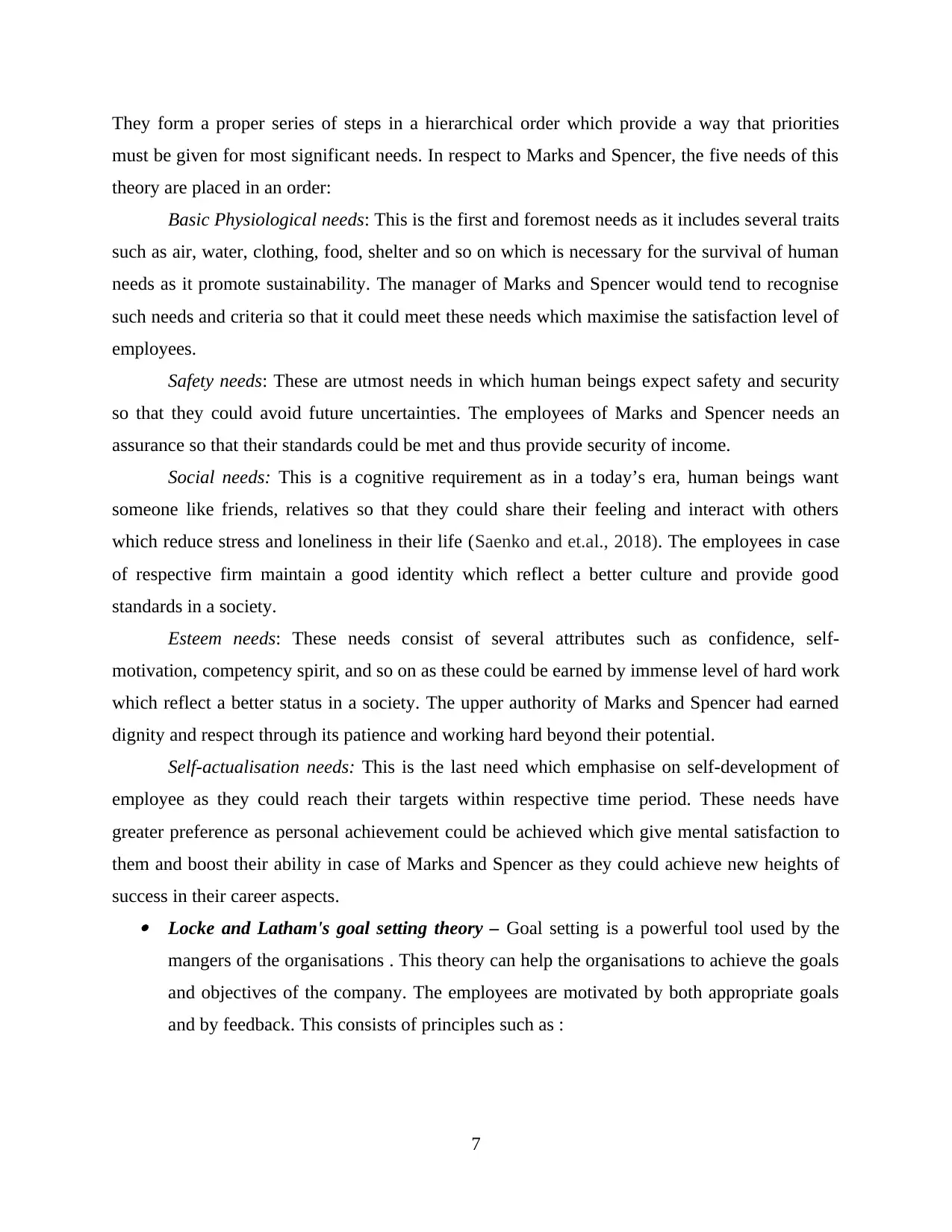
They form a proper series of steps in a hierarchical order which provide a way that priorities
must be given for most significant needs. In respect to Marks and Spencer, the five needs of this
theory are placed in an order:
Basic Physiological needs: This is the first and foremost needs as it includes several traits
such as air, water, clothing, food, shelter and so on which is necessary for the survival of human
needs as it promote sustainability. The manager of Marks and Spencer would tend to recognise
such needs and criteria so that it could meet these needs which maximise the satisfaction level of
employees.
Safety needs: These are utmost needs in which human beings expect safety and security
so that they could avoid future uncertainties. The employees of Marks and Spencer needs an
assurance so that their standards could be met and thus provide security of income.
Social needs: This is a cognitive requirement as in a today’s era, human beings want
someone like friends, relatives so that they could share their feeling and interact with others
which reduce stress and loneliness in their life (Saenko and et.al., 2018). The employees in case
of respective firm maintain a good identity which reflect a better culture and provide good
standards in a society.
Esteem needs: These needs consist of several attributes such as confidence, self-
motivation, competency spirit, and so on as these could be earned by immense level of hard work
which reflect a better status in a society. The upper authority of Marks and Spencer had earned
dignity and respect through its patience and working hard beyond their potential.
Self-actualisation needs: This is the last need which emphasise on self-development of
employee as they could reach their targets within respective time period. These needs have
greater preference as personal achievement could be achieved which give mental satisfaction to
them and boost their ability in case of Marks and Spencer as they could achieve new heights of
success in their career aspects. Locke and Latham's goal setting theory – Goal setting is a powerful tool used by the
mangers of the organisations . This theory can help the organisations to achieve the goals
and objectives of the company. The employees are motivated by both appropriate goals
and by feedback. This consists of principles such as :
7
must be given for most significant needs. In respect to Marks and Spencer, the five needs of this
theory are placed in an order:
Basic Physiological needs: This is the first and foremost needs as it includes several traits
such as air, water, clothing, food, shelter and so on which is necessary for the survival of human
needs as it promote sustainability. The manager of Marks and Spencer would tend to recognise
such needs and criteria so that it could meet these needs which maximise the satisfaction level of
employees.
Safety needs: These are utmost needs in which human beings expect safety and security
so that they could avoid future uncertainties. The employees of Marks and Spencer needs an
assurance so that their standards could be met and thus provide security of income.
Social needs: This is a cognitive requirement as in a today’s era, human beings want
someone like friends, relatives so that they could share their feeling and interact with others
which reduce stress and loneliness in their life (Saenko and et.al., 2018). The employees in case
of respective firm maintain a good identity which reflect a better culture and provide good
standards in a society.
Esteem needs: These needs consist of several attributes such as confidence, self-
motivation, competency spirit, and so on as these could be earned by immense level of hard work
which reflect a better status in a society. The upper authority of Marks and Spencer had earned
dignity and respect through its patience and working hard beyond their potential.
Self-actualisation needs: This is the last need which emphasise on self-development of
employee as they could reach their targets within respective time period. These needs have
greater preference as personal achievement could be achieved which give mental satisfaction to
them and boost their ability in case of Marks and Spencer as they could achieve new heights of
success in their career aspects. Locke and Latham's goal setting theory – Goal setting is a powerful tool used by the
mangers of the organisations . This theory can help the organisations to achieve the goals
and objectives of the company. The employees are motivated by both appropriate goals
and by feedback. This consists of principles such as :
7
Paraphrase This Document
Need a fresh take? Get an instant paraphrase of this document with our AI Paraphraser
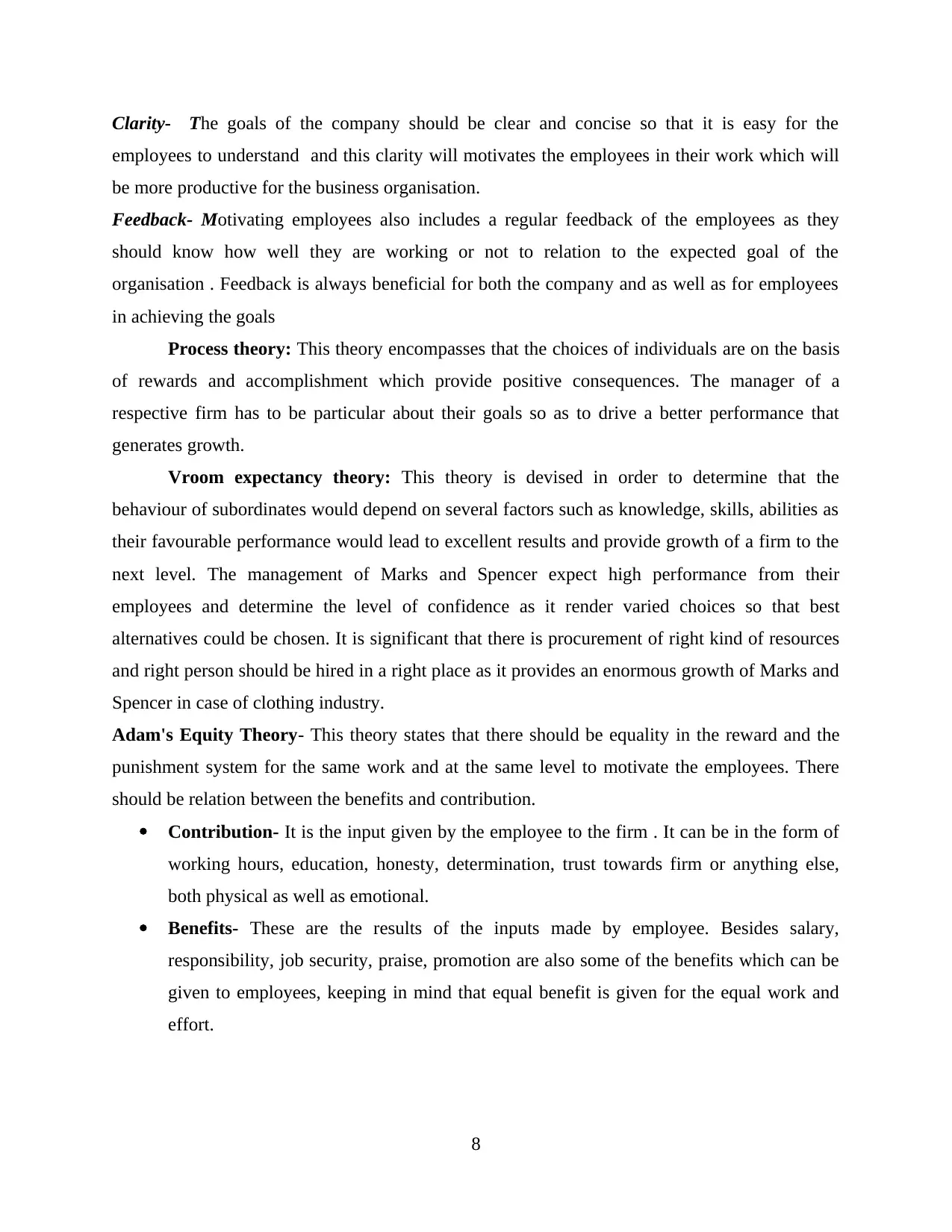
Clarity- The goals of the company should be clear and concise so that it is easy for the
employees to understand and this clarity will motivates the employees in their work which will
be more productive for the business organisation.
Feedback- Motivating employees also includes a regular feedback of the employees as they
should know how well they are working or not to relation to the expected goal of the
organisation . Feedback is always beneficial for both the company and as well as for employees
in achieving the goals
Process theory: This theory encompasses that the choices of individuals are on the basis
of rewards and accomplishment which provide positive consequences. The manager of a
respective firm has to be particular about their goals so as to drive a better performance that
generates growth.
Vroom expectancy theory: This theory is devised in order to determine that the
behaviour of subordinates would depend on several factors such as knowledge, skills, abilities as
their favourable performance would lead to excellent results and provide growth of a firm to the
next level. The management of Marks and Spencer expect high performance from their
employees and determine the level of confidence as it render varied choices so that best
alternatives could be chosen. It is significant that there is procurement of right kind of resources
and right person should be hired in a right place as it provides an enormous growth of Marks and
Spencer in case of clothing industry.
Adam's Equity Theory- This theory states that there should be equality in the reward and the
punishment system for the same work and at the same level to motivate the employees. There
should be relation between the benefits and contribution.
Contribution- It is the input given by the employee to the firm . It can be in the form of
working hours, education, honesty, determination, trust towards firm or anything else,
both physical as well as emotional.
Benefits- These are the results of the inputs made by employee. Besides salary,
responsibility, job security, praise, promotion are also some of the benefits which can be
given to employees, keeping in mind that equal benefit is given for the equal work and
effort.
8
employees to understand and this clarity will motivates the employees in their work which will
be more productive for the business organisation.
Feedback- Motivating employees also includes a regular feedback of the employees as they
should know how well they are working or not to relation to the expected goal of the
organisation . Feedback is always beneficial for both the company and as well as for employees
in achieving the goals
Process theory: This theory encompasses that the choices of individuals are on the basis
of rewards and accomplishment which provide positive consequences. The manager of a
respective firm has to be particular about their goals so as to drive a better performance that
generates growth.
Vroom expectancy theory: This theory is devised in order to determine that the
behaviour of subordinates would depend on several factors such as knowledge, skills, abilities as
their favourable performance would lead to excellent results and provide growth of a firm to the
next level. The management of Marks and Spencer expect high performance from their
employees and determine the level of confidence as it render varied choices so that best
alternatives could be chosen. It is significant that there is procurement of right kind of resources
and right person should be hired in a right place as it provides an enormous growth of Marks and
Spencer in case of clothing industry.
Adam's Equity Theory- This theory states that there should be equality in the reward and the
punishment system for the same work and at the same level to motivate the employees. There
should be relation between the benefits and contribution.
Contribution- It is the input given by the employee to the firm . It can be in the form of
working hours, education, honesty, determination, trust towards firm or anything else,
both physical as well as emotional.
Benefits- These are the results of the inputs made by employee. Besides salary,
responsibility, job security, praise, promotion are also some of the benefits which can be
given to employees, keeping in mind that equal benefit is given for the equal work and
effort.
8
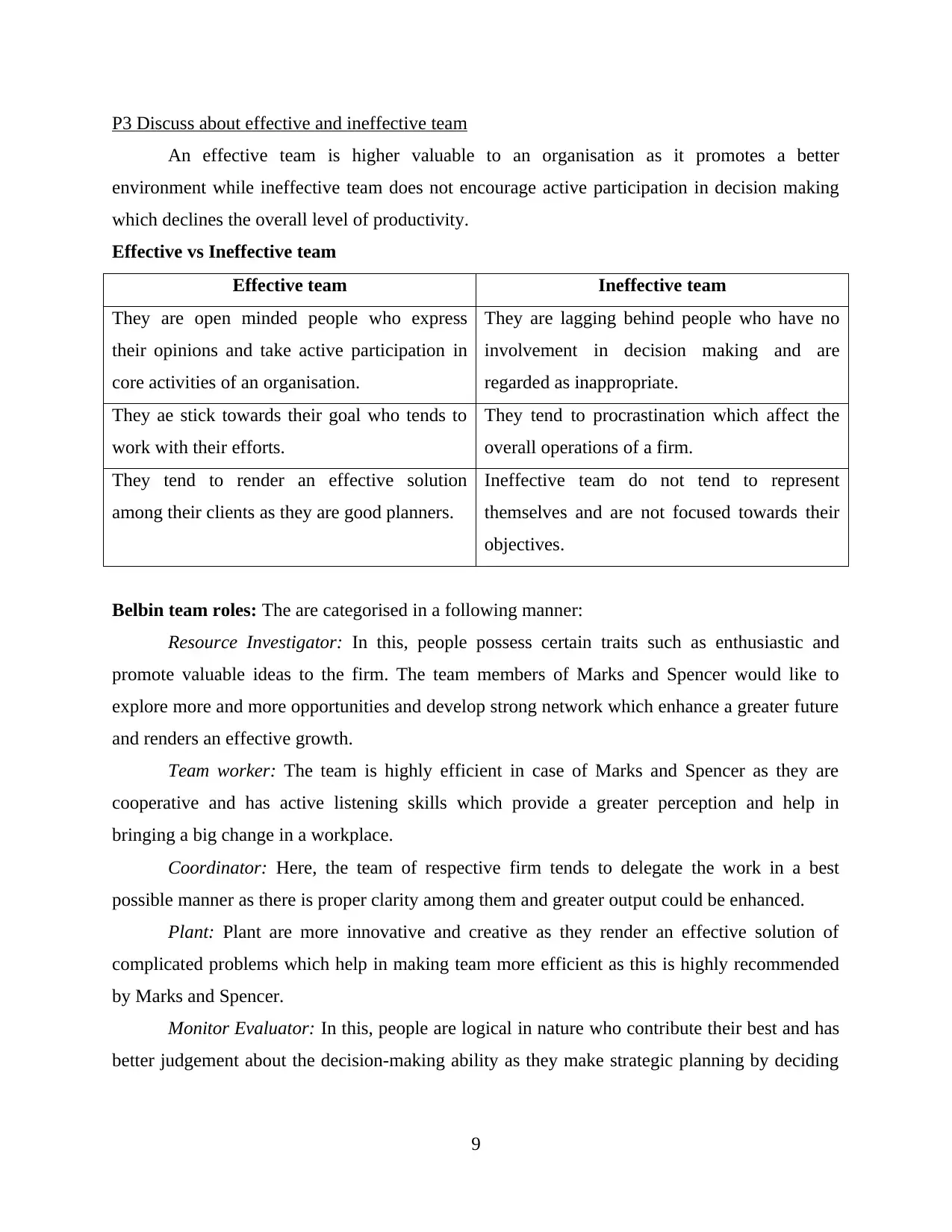
P3 Discuss about effective and ineffective team
An effective team is higher valuable to an organisation as it promotes a better
environment while ineffective team does not encourage active participation in decision making
which declines the overall level of productivity.
Effective vs Ineffective team
Effective team Ineffective team
They are open minded people who express
their opinions and take active participation in
core activities of an organisation.
They are lagging behind people who have no
involvement in decision making and are
regarded as inappropriate.
They ae stick towards their goal who tends to
work with their efforts.
They tend to procrastination which affect the
overall operations of a firm.
They tend to render an effective solution
among their clients as they are good planners.
Ineffective team do not tend to represent
themselves and are not focused towards their
objectives.
Belbin team roles: The are categorised in a following manner:
Resource Investigator: In this, people possess certain traits such as enthusiastic and
promote valuable ideas to the firm. The team members of Marks and Spencer would like to
explore more and more opportunities and develop strong network which enhance a greater future
and renders an effective growth.
Team worker: The team is highly efficient in case of Marks and Spencer as they are
cooperative and has active listening skills which provide a greater perception and help in
bringing a big change in a workplace.
Coordinator: Here, the team of respective firm tends to delegate the work in a best
possible manner as there is proper clarity among them and greater output could be enhanced.
Plant: Plant are more innovative and creative as they render an effective solution of
complicated problems which help in making team more efficient as this is highly recommended
by Marks and Spencer.
Monitor Evaluator: In this, people are logical in nature who contribute their best and has
better judgement about the decision-making ability as they make strategic planning by deciding
9
An effective team is higher valuable to an organisation as it promotes a better
environment while ineffective team does not encourage active participation in decision making
which declines the overall level of productivity.
Effective vs Ineffective team
Effective team Ineffective team
They are open minded people who express
their opinions and take active participation in
core activities of an organisation.
They are lagging behind people who have no
involvement in decision making and are
regarded as inappropriate.
They ae stick towards their goal who tends to
work with their efforts.
They tend to procrastination which affect the
overall operations of a firm.
They tend to render an effective solution
among their clients as they are good planners.
Ineffective team do not tend to represent
themselves and are not focused towards their
objectives.
Belbin team roles: The are categorised in a following manner:
Resource Investigator: In this, people possess certain traits such as enthusiastic and
promote valuable ideas to the firm. The team members of Marks and Spencer would like to
explore more and more opportunities and develop strong network which enhance a greater future
and renders an effective growth.
Team worker: The team is highly efficient in case of Marks and Spencer as they are
cooperative and has active listening skills which provide a greater perception and help in
bringing a big change in a workplace.
Coordinator: Here, the team of respective firm tends to delegate the work in a best
possible manner as there is proper clarity among them and greater output could be enhanced.
Plant: Plant are more innovative and creative as they render an effective solution of
complicated problems which help in making team more efficient as this is highly recommended
by Marks and Spencer.
Monitor Evaluator: In this, people are logical in nature who contribute their best and has
better judgement about the decision-making ability as they make strategic planning by deciding
9
⊘ This is a preview!⊘
Do you want full access?
Subscribe today to unlock all pages.

Trusted by 1+ million students worldwide
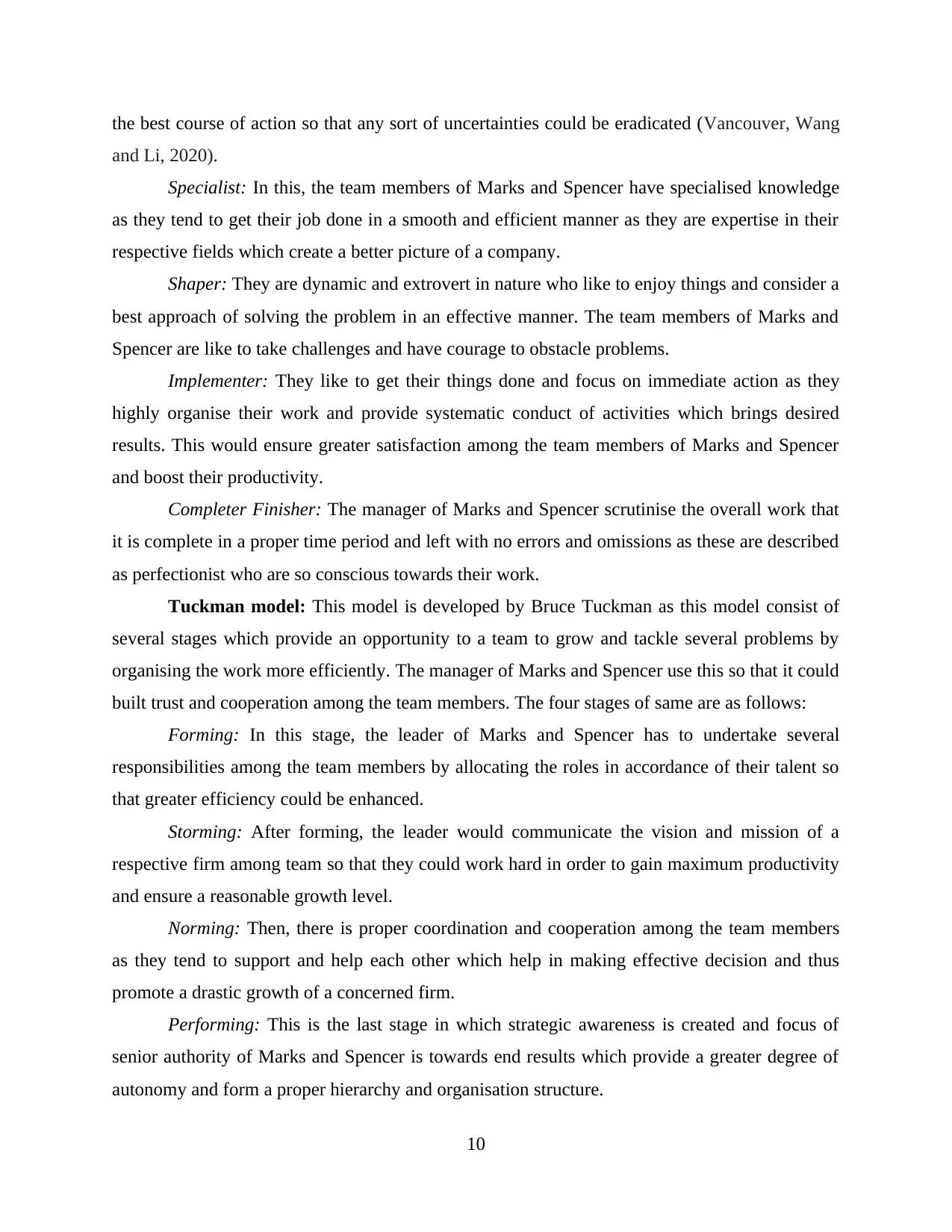
the best course of action so that any sort of uncertainties could be eradicated (Vancouver, Wang
and Li, 2020).
Specialist: In this, the team members of Marks and Spencer have specialised knowledge
as they tend to get their job done in a smooth and efficient manner as they are expertise in their
respective fields which create a better picture of a company.
Shaper: They are dynamic and extrovert in nature who like to enjoy things and consider a
best approach of solving the problem in an effective manner. The team members of Marks and
Spencer are like to take challenges and have courage to obstacle problems.
Implementer: They like to get their things done and focus on immediate action as they
highly organise their work and provide systematic conduct of activities which brings desired
results. This would ensure greater satisfaction among the team members of Marks and Spencer
and boost their productivity.
Completer Finisher: The manager of Marks and Spencer scrutinise the overall work that
it is complete in a proper time period and left with no errors and omissions as these are described
as perfectionist who are so conscious towards their work.
Tuckman model: This model is developed by Bruce Tuckman as this model consist of
several stages which provide an opportunity to a team to grow and tackle several problems by
organising the work more efficiently. The manager of Marks and Spencer use this so that it could
built trust and cooperation among the team members. The four stages of same are as follows:
Forming: In this stage, the leader of Marks and Spencer has to undertake several
responsibilities among the team members by allocating the roles in accordance of their talent so
that greater efficiency could be enhanced.
Storming: After forming, the leader would communicate the vision and mission of a
respective firm among team so that they could work hard in order to gain maximum productivity
and ensure a reasonable growth level.
Norming: Then, there is proper coordination and cooperation among the team members
as they tend to support and help each other which help in making effective decision and thus
promote a drastic growth of a concerned firm.
Performing: This is the last stage in which strategic awareness is created and focus of
senior authority of Marks and Spencer is towards end results which provide a greater degree of
autonomy and form a proper hierarchy and organisation structure.
10
and Li, 2020).
Specialist: In this, the team members of Marks and Spencer have specialised knowledge
as they tend to get their job done in a smooth and efficient manner as they are expertise in their
respective fields which create a better picture of a company.
Shaper: They are dynamic and extrovert in nature who like to enjoy things and consider a
best approach of solving the problem in an effective manner. The team members of Marks and
Spencer are like to take challenges and have courage to obstacle problems.
Implementer: They like to get their things done and focus on immediate action as they
highly organise their work and provide systematic conduct of activities which brings desired
results. This would ensure greater satisfaction among the team members of Marks and Spencer
and boost their productivity.
Completer Finisher: The manager of Marks and Spencer scrutinise the overall work that
it is complete in a proper time period and left with no errors and omissions as these are described
as perfectionist who are so conscious towards their work.
Tuckman model: This model is developed by Bruce Tuckman as this model consist of
several stages which provide an opportunity to a team to grow and tackle several problems by
organising the work more efficiently. The manager of Marks and Spencer use this so that it could
built trust and cooperation among the team members. The four stages of same are as follows:
Forming: In this stage, the leader of Marks and Spencer has to undertake several
responsibilities among the team members by allocating the roles in accordance of their talent so
that greater efficiency could be enhanced.
Storming: After forming, the leader would communicate the vision and mission of a
respective firm among team so that they could work hard in order to gain maximum productivity
and ensure a reasonable growth level.
Norming: Then, there is proper coordination and cooperation among the team members
as they tend to support and help each other which help in making effective decision and thus
promote a drastic growth of a concerned firm.
Performing: This is the last stage in which strategic awareness is created and focus of
senior authority of Marks and Spencer is towards end results which provide a greater degree of
autonomy and form a proper hierarchy and organisation structure.
10
Paraphrase This Document
Need a fresh take? Get an instant paraphrase of this document with our AI Paraphraser
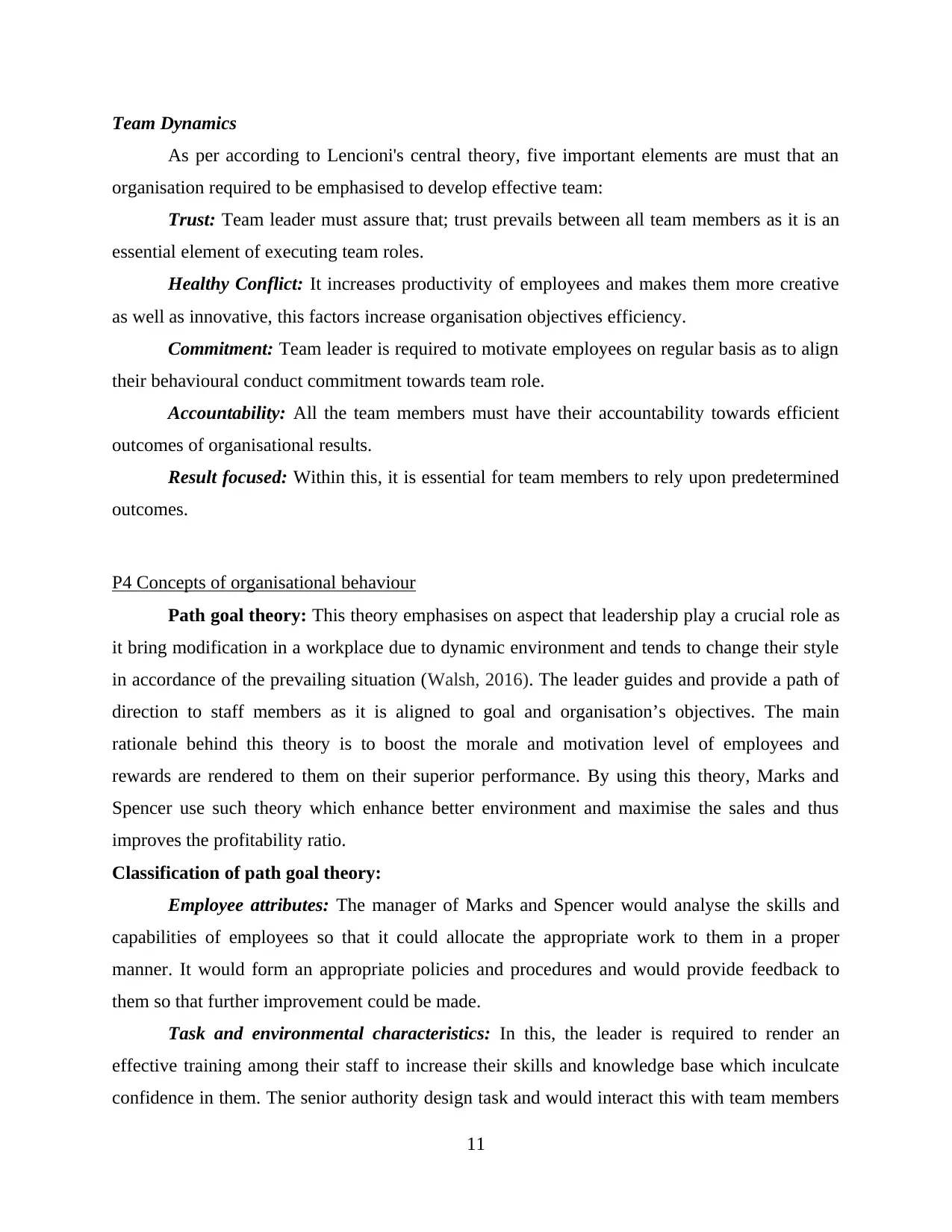
Team Dynamics
As per according to Lencioni's central theory, five important elements are must that an
organisation required to be emphasised to develop effective team:
Trust: Team leader must assure that; trust prevails between all team members as it is an
essential element of executing team roles.
Healthy Conflict: It increases productivity of employees and makes them more creative
as well as innovative, this factors increase organisation objectives efficiency.
Commitment: Team leader is required to motivate employees on regular basis as to align
their behavioural conduct commitment towards team role.
Accountability: All the team members must have their accountability towards efficient
outcomes of organisational results.
Result focused: Within this, it is essential for team members to rely upon predetermined
outcomes.
P4 Concepts of organisational behaviour
Path goal theory: This theory emphasises on aspect that leadership play a crucial role as
it bring modification in a workplace due to dynamic environment and tends to change their style
in accordance of the prevailing situation (Walsh, 2016). The leader guides and provide a path of
direction to staff members as it is aligned to goal and organisation’s objectives. The main
rationale behind this theory is to boost the morale and motivation level of employees and
rewards are rendered to them on their superior performance. By using this theory, Marks and
Spencer use such theory which enhance better environment and maximise the sales and thus
improves the profitability ratio.
Classification of path goal theory:
Employee attributes: The manager of Marks and Spencer would analyse the skills and
capabilities of employees so that it could allocate the appropriate work to them in a proper
manner. It would form an appropriate policies and procedures and would provide feedback to
them so that further improvement could be made.
Task and environmental characteristics: In this, the leader is required to render an
effective training among their staff to increase their skills and knowledge base which inculcate
confidence in them. The senior authority design task and would interact this with team members
11
As per according to Lencioni's central theory, five important elements are must that an
organisation required to be emphasised to develop effective team:
Trust: Team leader must assure that; trust prevails between all team members as it is an
essential element of executing team roles.
Healthy Conflict: It increases productivity of employees and makes them more creative
as well as innovative, this factors increase organisation objectives efficiency.
Commitment: Team leader is required to motivate employees on regular basis as to align
their behavioural conduct commitment towards team role.
Accountability: All the team members must have their accountability towards efficient
outcomes of organisational results.
Result focused: Within this, it is essential for team members to rely upon predetermined
outcomes.
P4 Concepts of organisational behaviour
Path goal theory: This theory emphasises on aspect that leadership play a crucial role as
it bring modification in a workplace due to dynamic environment and tends to change their style
in accordance of the prevailing situation (Walsh, 2016). The leader guides and provide a path of
direction to staff members as it is aligned to goal and organisation’s objectives. The main
rationale behind this theory is to boost the morale and motivation level of employees and
rewards are rendered to them on their superior performance. By using this theory, Marks and
Spencer use such theory which enhance better environment and maximise the sales and thus
improves the profitability ratio.
Classification of path goal theory:
Employee attributes: The manager of Marks and Spencer would analyse the skills and
capabilities of employees so that it could allocate the appropriate work to them in a proper
manner. It would form an appropriate policies and procedures and would provide feedback to
them so that further improvement could be made.
Task and environmental characteristics: In this, the leader is required to render an
effective training among their staff to increase their skills and knowledge base which inculcate
confidence in them. The senior authority design task and would interact this with team members
11
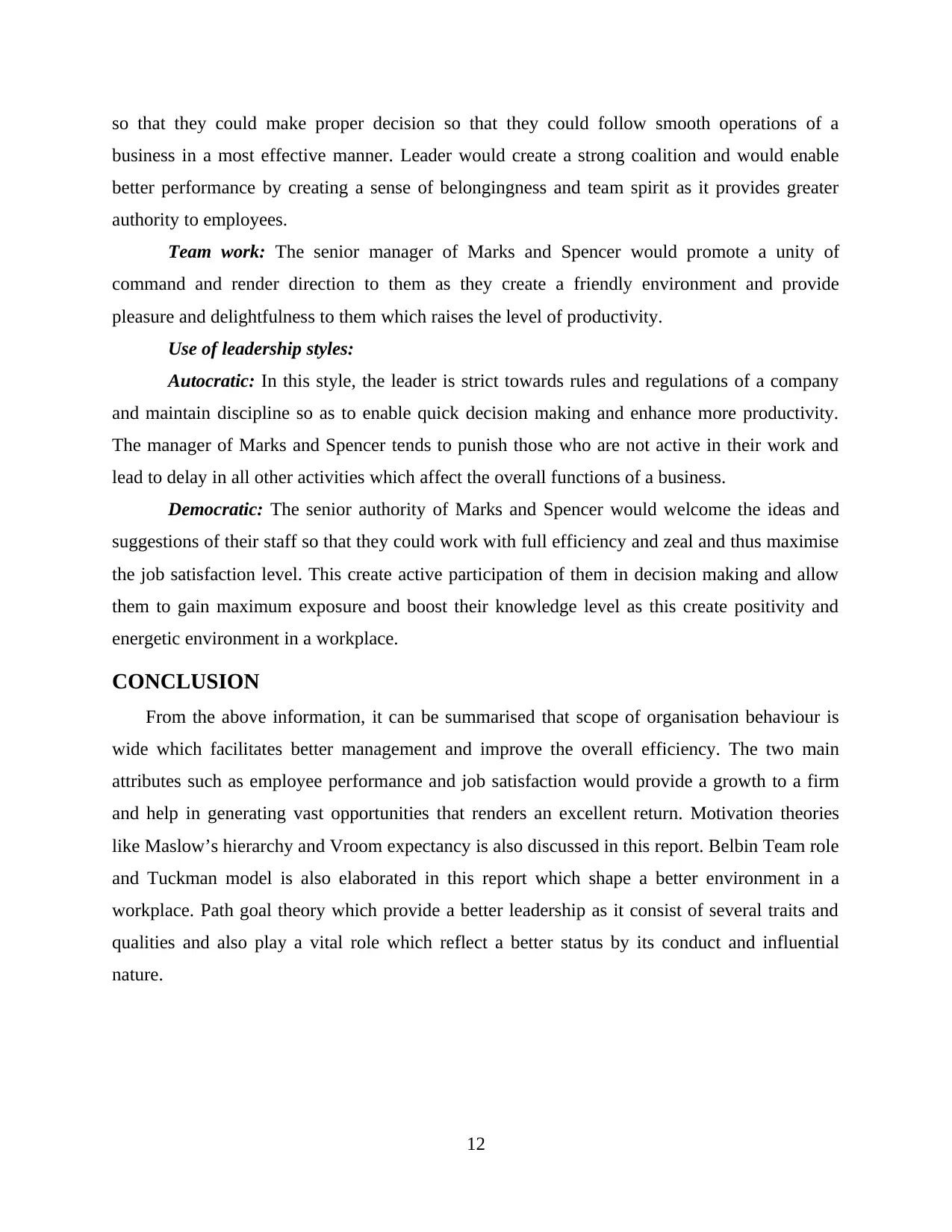
so that they could make proper decision so that they could follow smooth operations of a
business in a most effective manner. Leader would create a strong coalition and would enable
better performance by creating a sense of belongingness and team spirit as it provides greater
authority to employees.
Team work: The senior manager of Marks and Spencer would promote a unity of
command and render direction to them as they create a friendly environment and provide
pleasure and delightfulness to them which raises the level of productivity.
Use of leadership styles:
Autocratic: In this style, the leader is strict towards rules and regulations of a company
and maintain discipline so as to enable quick decision making and enhance more productivity.
The manager of Marks and Spencer tends to punish those who are not active in their work and
lead to delay in all other activities which affect the overall functions of a business.
Democratic: The senior authority of Marks and Spencer would welcome the ideas and
suggestions of their staff so that they could work with full efficiency and zeal and thus maximise
the job satisfaction level. This create active participation of them in decision making and allow
them to gain maximum exposure and boost their knowledge level as this create positivity and
energetic environment in a workplace.
CONCLUSION
From the above information, it can be summarised that scope of organisation behaviour is
wide which facilitates better management and improve the overall efficiency. The two main
attributes such as employee performance and job satisfaction would provide a growth to a firm
and help in generating vast opportunities that renders an excellent return. Motivation theories
like Maslow’s hierarchy and Vroom expectancy is also discussed in this report. Belbin Team role
and Tuckman model is also elaborated in this report which shape a better environment in a
workplace. Path goal theory which provide a better leadership as it consist of several traits and
qualities and also play a vital role which reflect a better status by its conduct and influential
nature.
12
business in a most effective manner. Leader would create a strong coalition and would enable
better performance by creating a sense of belongingness and team spirit as it provides greater
authority to employees.
Team work: The senior manager of Marks and Spencer would promote a unity of
command and render direction to them as they create a friendly environment and provide
pleasure and delightfulness to them which raises the level of productivity.
Use of leadership styles:
Autocratic: In this style, the leader is strict towards rules and regulations of a company
and maintain discipline so as to enable quick decision making and enhance more productivity.
The manager of Marks and Spencer tends to punish those who are not active in their work and
lead to delay in all other activities which affect the overall functions of a business.
Democratic: The senior authority of Marks and Spencer would welcome the ideas and
suggestions of their staff so that they could work with full efficiency and zeal and thus maximise
the job satisfaction level. This create active participation of them in decision making and allow
them to gain maximum exposure and boost their knowledge level as this create positivity and
energetic environment in a workplace.
CONCLUSION
From the above information, it can be summarised that scope of organisation behaviour is
wide which facilitates better management and improve the overall efficiency. The two main
attributes such as employee performance and job satisfaction would provide a growth to a firm
and help in generating vast opportunities that renders an excellent return. Motivation theories
like Maslow’s hierarchy and Vroom expectancy is also discussed in this report. Belbin Team role
and Tuckman model is also elaborated in this report which shape a better environment in a
workplace. Path goal theory which provide a better leadership as it consist of several traits and
qualities and also play a vital role which reflect a better status by its conduct and influential
nature.
12
⊘ This is a preview!⊘
Do you want full access?
Subscribe today to unlock all pages.

Trusted by 1+ million students worldwide
1 out of 14
Related Documents
Your All-in-One AI-Powered Toolkit for Academic Success.
+13062052269
info@desklib.com
Available 24*7 on WhatsApp / Email
![[object Object]](/_next/static/media/star-bottom.7253800d.svg)
Unlock your academic potential
Copyright © 2020–2026 A2Z Services. All Rights Reserved. Developed and managed by ZUCOL.





